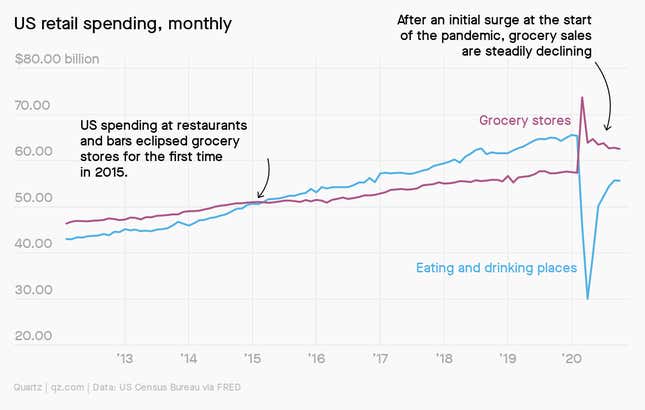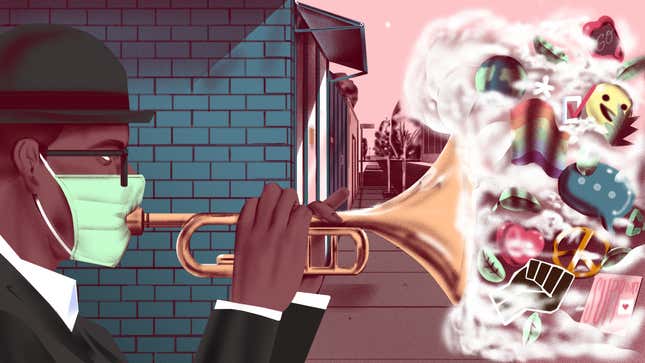Good morning, Quartz readers!
Here’s what you need to know
The UK announced its biggest investment in its military in 30 years. Part of the £16.5 billion ($21.8 billion) investment, to be rolled out over the next four years, will be spent on creating a national cyber force, a space command, and an artificial intelligence agency. Meanwhile, the UK is close to signing a new trade deal with Canada.
EU leaders look to rescue their rescue budget. Ministers will debate at a virtual summit how to address the impasse created after Hungary and Poland blocked the €1.8 trillion ($2.1 trillion) budget and recovery fund. And since the EU’s chief Brexit negotiator canceled a briefing scheduled for yesterday, chances of clinching a deal with the UK this week seem unlikely.
Five democracies asked China to end its crackdown on Hong Kong. The UK, US, Australia, New Zealand, and Canada urged Beijing to reconsider its disqualification rules targeting the city’s opposition lawmakers, and called for the re-instatement of legislators dismissed under the new rules last week.
Australia found evidence its forces killed Afghan civilians. A four-year war crimes investigation by the Australian Defence Force found soldiers of an elite unit killed 39 civilians and prisoners during the Afghan conflict, and urged criminal inquiries be opened.
Apple will pay $113 million to settle another “batterygate” lawsuit. This settlement deals with allegations that it concealed the iPhone battery problems from customers in 2016, which the company denies doing. In an earlier settlement, it agreed to pay affected users up to $500 million.
The coronavirus vaccine also-rans
“Even if it’s not the new Viagra, it still can make a considerable amount of money, even if you’re only getting a couple of dollars per dose.” —Christopher Snyder, a professor of economics at Dartmouth College
While Pfizer and Moderna will likely receive government approval first, Snyder—who is a member of Accelerating Health Technologies, a group focused on the financial and economic cases for vaccine development—says there is still money to be made even for the fourth, fifth, or sixth vaccine in line. Reporter Annalisa Merelli explains.
Charting US food spending
Americans are tired of cooking at home. While spending at grocery stores spiked as consumers stocked up for lockdowns earlier in the year, data from the US Census shows several months of steady declines and increased spending at bars and restaurants.

Growing fatigue about food preparation, cooking, and dishwashing has also meant significant growth in sales of meal kits and prepared foods.
Kings and queens

On New Year’s Eve, 1962, a 13-year-old named Valery Saifudinov took the stage with his band at a party in Latvia’s capital city Riga, then still under Soviet control. In front of a crowd of several hundred factory workers, the group launched into covers of songs by artists such as Chuck Berry and Little Richard—Black Americans who, along with forebears like Sister Rosetta Tharpe, created rock ‘n’ roll. The crowd loved it.
By the time of that performance, rock records had been circulating in the Soviet Union, despite authorities restricting them. They feared what the music represented: It was new, dangerous, and rebellious—in a word, cool. In the years that followed, rock music would become so popular debates persist over whether it stoked dissent that helped destabilize the Soviet regime.
Culture is one of America’s most powerful means of exerting its influence in the world, and in ways large and small, Black Americans have shaped that culture. They’ve held an outsized sway on what the US, and consequently much of the globe, deems cool. Read more in our latest field guide to the new meaning of cool.
✦ It may not be as cool as Chuck Berry, but a Quartz membership will always give you the global perspective. Try a seven-day free trial.
We’re obsessed with QR codes
It’s finally hip to be square. After a decade of mockery in the West, QR codes—those little black-and-white square patterns you scan with your phone to pull up a website—are finally having their moment in the pandemic. They’re replacing restaurant menus, enabling contactless payments, and even providing proof that the bearer doesn’t have Covid-19. Of course, these developments aren’t so novel in places like China, where QR codes are a ubiquitous tool for digital payments. Scan the history with the Quartz Weekly Obsession.
Get the Quartz Weekly Obsession delivered to your inbox by signing up below.
Surprising discoveries
Giant yellow rubber duckies are protest tools in Thailand. After joking they’d use them to get to the capital’s barricaded riverfront parliament, protesters used them as shields against tear gas.
New York City’s famous Christmas tree looks a bit patchy this year. The spruce newly installed at Rockefeller Center drew critiques on social media—but its owl stowaway was a hit.
Delta found a creative loophole for avoiding US tariffs. The airliner flies its new Airbus planes to cities like Amsterdam and Tokyo before they head stateside.
Madagascar is slowly breaking up into smaller islands. A new study found the East African Rift system extends as far as the island nation.
A tiger wandered 3,000 km (1,864 miles) in India. Named Walker by wildlife officials who tracked him with GPS, he eventually settled down in a sanctuary in the western state of Maharashtra.
Our best wishes for a productive day. Please send any news, comments, animals hiding in Christmas trees, and drifting islands to hi@qz.com. Get the most out of Quartz by downloading our iOS app and becoming a member. Today’s Daily Brief was brought to you by Jane Li, Tripti Lahiri, Liz Webber, and Ana Campoy.